Sanaysay at mga larawan ni Denver del Rosario
Umulan ma’y hindi nagpatinag ang sambayanan, at kanilang isinigaw ang patuloy na panawagan, “Never again!”
Sa hiyaw ng madla’y nangibabaw ang isang sektor ng lipunan na walang-sawang kumikilos at nagmumulat para sa kalayaan ng bansa. Halos limang dekada na ang nakalipas mula sa pinakamadilim na bahagi ng ating kasaysayan, ngunit hanggang ngayo’y kasama pa rin ito sa laban. Patuloy sitong nagpapaalala sa mga kasalanan ng lipunan at kumukontra sa pagbubulag-bulagan sa panahong inaapakan ang mga karapatan ng mamamayan.
Ika nga ni Lean Alejandro, patuloy na babalik ang kabataan.
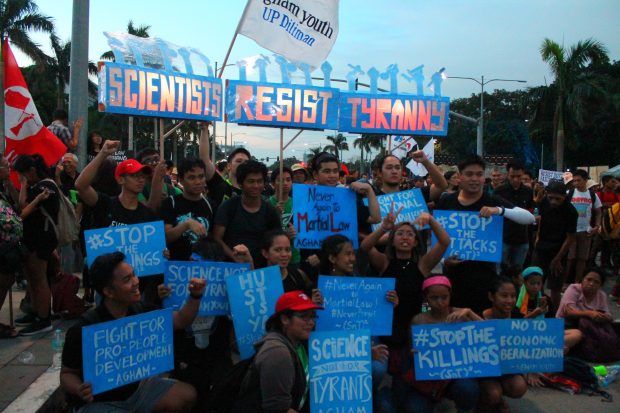
Muling gumawa ng kasaysayan ang sambayanang Pilipino noong nakaraang Biyernes, kung saan kasama ng kabataan ang iba’t ibang sektor ng lipunan upang gunitain ang ika-46 anibersaryo ng batas militar sa Pilipinas sa ilalim ng diktador na si Ferdinand E. Marcos. Taas-kamaong pinagpugayan ng sambayanan ang mga taong naglaan ng kanilang mga buhay upang labanan ang diktadurya at tiraniya noong panahong iyon.
Isa si Andrew Mencias, 20, sa naitalang labinlimang-libong nagprotesta sa Luneta. Kasama ang kanyang mga kaibigan mula UP Diliman ay tumungo siya sa Luneta upang sumama sa mas malawak na hanay ng mamamayan. Kasabay ng pag-alala sa kamatayan ng demokrasya ay ang pagkundena sa nagbabadyang pagbabalik ng pamilyang Marcos sa mas mataas na kapangyarihang politikal at ang patuloy na pagtapak sa karapatang pantao ng kasalukuyang administrasyongRodrigo Duterte.
“Pumunta ako ng Luneta dahil naniniwala ako sa kahalagahan ng sama-samang pagkilos,” ani Mencias. “Para sa akin, maraming bagay tayong dapat nating natatamasa pero hindi natin nakukuha.”
Nagkataong itinakda din noong nakaraang Biyernes ang Pandaigdigang Araw ng Kapayapaan, ngunit isa itong malaking kabalintunaan sa ating bansa. Sa araw na ito’y binabalikan ng sambayanan ang taong 1972, kung kailan tinanggal ang kalayaan ng mamamayan. Kung iisipi’y ilang dekada nang lumipas, subalit muli itong nagiging tampok ngayon kaugnay ng pamamalakad ng administrasyong Duterte, na inihahalintulad ng mga grupong sektoral kay Marcos.
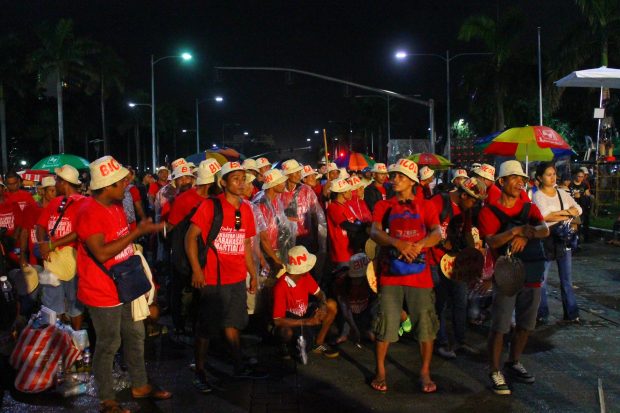 Patuloy ang pagnupuna at pagkukundena ng iba’t ibang mga grupo sa kasalukuyang administrasyon dahil sa kawalang-respeto nito sa karapatang pantao at ang patuloy na pagsasabatas ng mga anti-mamamayang polisiya. Aktibong lumalahok sa mga pagkilos ang kabataan—kasabay ng pagsama sa iba’t ibang mobilisasyon ay ang pagsulong ng kanilang mga adbokasiya bilang tugon sa iba’t ibang isyung panlipunan.
Patuloy ang pagnupuna at pagkukundena ng iba’t ibang mga grupo sa kasalukuyang administrasyon dahil sa kawalang-respeto nito sa karapatang pantao at ang patuloy na pagsasabatas ng mga anti-mamamayang polisiya. Aktibong lumalahok sa mga pagkilos ang kabataan—kasabay ng pagsama sa iba’t ibang mobilisasyon ay ang pagsulong ng kanilang mga adbokasiya bilang tugon sa iba’t ibang isyung panlipunan.
Katulad na lamang ni Mencias na nakikiisa sa laban ng kabataan para sa libreng edukasyon, na itinuturing niyang pundasyon ng isang progresibong lipunan. Habang malayo na ang narating ng kampanya, patuloy pa rin ang mga dagok na humahadlang upang makamit ang edukasyon para sa lahat.
“Nakakalungkot na pangit yung quality ng maraming public schools dito sa atin,” ani Mencias. “Nakakulong pa rin tayo sa isang sistemang wala tayong napapala.”
Kamakailan lamang ay napagtagumpayan ng kabataan na tanggalin ang Return Service Agreement mula sa Implementing Rules and Regulations (IRR) ng RA 10931 o ang Universal Access to Quality Tertiary Education Act of 2017. Matagal nang pinupuna ng mga estudyante ang probisyong ito—ayon sa National Union of Students of the Philippines (NUSP), ang edukasyon ay karapatan at dapat walang kapalit.
Gayunpaman, sa maliliit na hakbang ay patuloy pa rin ang mga banta sa karapatang ito, katulad ng nagbabadyang budget cut sa edukasyon at ang pasuweldo sa mga guro na hindi pa rin sapat.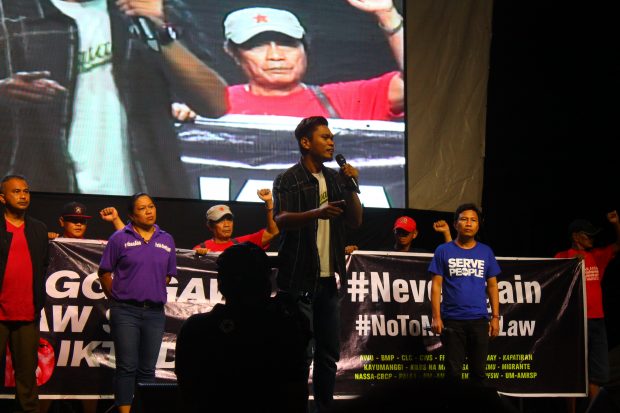
Isa pa sa isinusulong ni Mencias ay ang karapatan ng pambansang minorya, na patuloy na binubusabos ng kasalukuyang rehimen. “Higit sa lahat, sila yung pinaka-apektado ng mga batas, at hindi rin naman sila pinoprotektahan ng military,” ani Mencias.
Ayon sa Save our Schools (SOS) Network, kamakailan lamang ay pitong kabataang Moro ang pinatay ng mga militar sa Patikul, Sulu sa ilalim ng batas militar sa Mindanao—bukod pa dito ay ang serye ng mga pagbomba sa mga katutubong komunidad at mga kaso ng puwersahang pagsuko sa kamay ng mga puwersang gobyerno, isang manipestasyon na patuloy pa rin ang paglabag ng estado sa karapatang pantao.
Isang patunay si Mencias sa libo-libong kabataang patuloy na nakikibaka para sa tunay na pagbabagong panlipunan at tumatangging kalimutan ang ating masalimuot na nakaraan. Patuloy nilang ginagampanan ang kanilang papel bilang mga pag-asa ng bayan. Ang sabi ng iilan, huwag nang mangialam ang kabataan, hindi naman kayo buhay noong mga panahong iyon.
Ngunit sila’y hindi magpapatinag.
“Hanggang ngayon naman, nararamdaman pa rin natin ang mga ginawa ni Marcos, ngayon pang gusto nilang bumalik sa mataas na kapangyarihan,” ani Mencias. “Dapat naman talaga nating binabalikan at pinag-uusapan ang kasaysayan, para maisakonteksto natin yung sitwasyon na meron tayo ngayon.”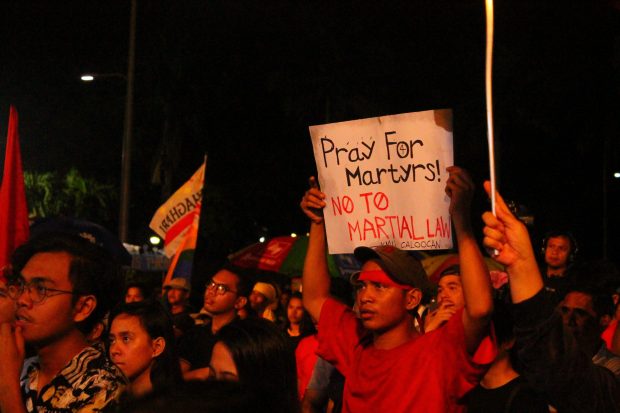
Kung babalikan ang 1970, ang kabataan ang nanguna sa panawagang baguhin ang sistemang pulitikal at pang-ekonomiko ng bansa. Sa Sigwa ng Unang Kwarto, kabataan ang nanguna sa paghingi ng pagbabagong panlipunan sa ilalim ng administrasyong Marcos, na nagpapakita na ng mga tendensiyang diktaduriyal. Maraming kabataan ang nagbuwis ng buhay upang ipaglaban ang kinabukasan ng inang bayan.
Halos limang dekada na ang lumipas, ngunit muli nilang pinatunayang patuloy silang lumalaban kasama ang sambayanan.
Hindi pa rin nagbabago ang lipunang ginagalawan—sa ilalim ng administrasyong Duterte, kinikitil ang mga pag-asa ng bayan at pilit pinipinturahan ito ng estado bilang “collateral damage”. Nariyan si Kian delos Santos, si Carl Arnaiz, at daan-daang kabataang biktima ng pambubusabos at paglabag sa karapatang pantao ng kasalukuyang liderato.
Ganoon pa rin ang sistemang pulitikal at pang-ekonomiko na patuloy na pinoprotektahan lamang ang interes ng makapangyarihang iilan. Patuloy ang pagtatangkang baguhin ang kasaysayan at ilagay sa pedestal ang diktador na kumitil ng maraming buhay at binaon ang bansa sa utang na hanggang ngayo’y pasanin ng mamamayan.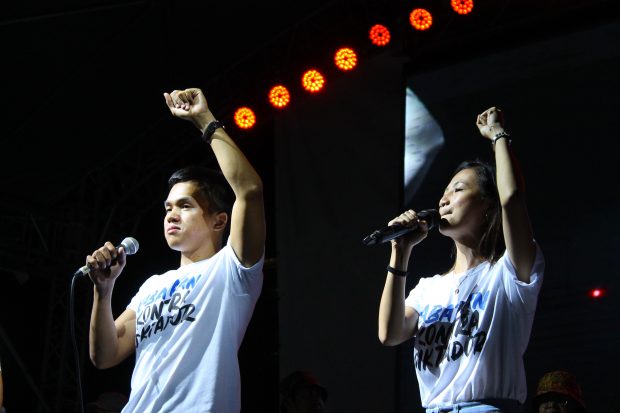
Patuloy pa rin ang laban.
Madalas na tinuturo sa mga paaralan na nakamtam muli ng sambayanan ang kalayaan matapos nilang pabagsakin ang diktadurya noong 1986. Ngunit alam ng kabataang hindi pa tunay na malaya ang bansa—mahaba lang ang tanikala. Sila ang patunay na hindi maaaring magbulag-bulagan ang mamamayan, lalo’t harap-harapan ang paglabag at ang pagsasawalang-bahala.
Ilang buhay man ang kunin, patuloy silang babalik at lalaban. #



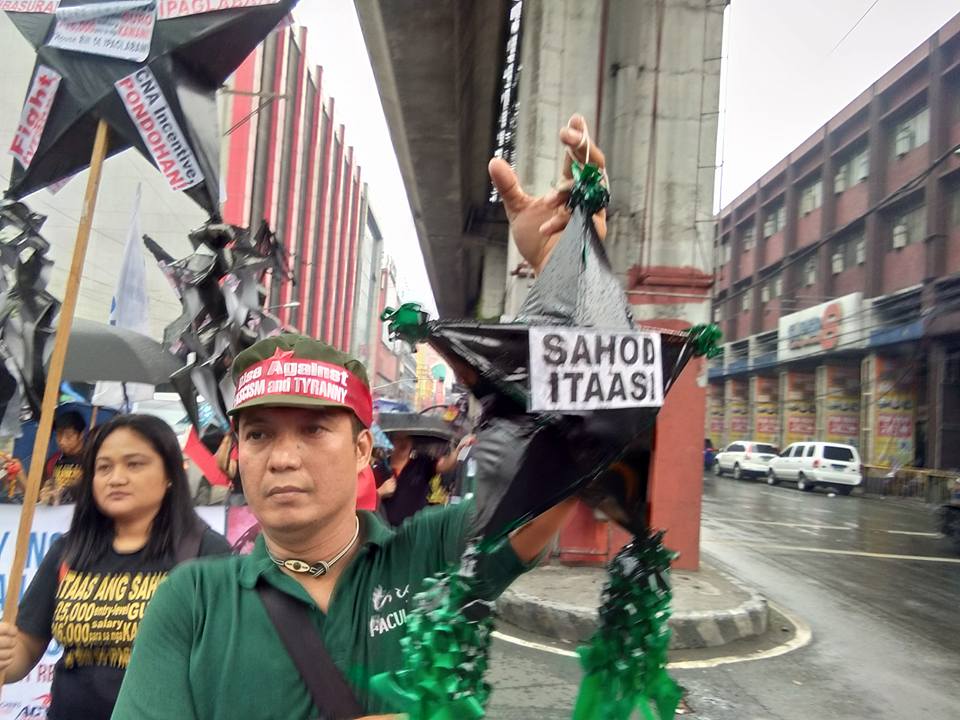

 Patuloy ang pagnupuna at pagkukundena ng iba’t ibang mga grupo sa kasalukuyang administrasyon dahil sa kawalang-respeto nito sa karapatang pantao at ang patuloy na pagsasabatas ng mga anti-mamamayang polisiya. Aktibong lumalahok sa mga pagkilos ang kabataan—kasabay ng pagsama sa iba’t ibang mobilisasyon ay ang pagsulong ng kanilang mga adbokasiya bilang tugon sa iba’t ibang isyung panlipunan.
Patuloy ang pagnupuna at pagkukundena ng iba’t ibang mga grupo sa kasalukuyang administrasyon dahil sa kawalang-respeto nito sa karapatang pantao at ang patuloy na pagsasabatas ng mga anti-mamamayang polisiya. Aktibong lumalahok sa mga pagkilos ang kabataan—kasabay ng pagsama sa iba’t ibang mobilisasyon ay ang pagsulong ng kanilang mga adbokasiya bilang tugon sa iba’t ibang isyung panlipunan.

